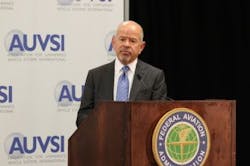UAV roundup 5/22: The latest in unmanned aerial vehicle news
Since the latest UAV roundup I did onApril 24, there is a lot to talk about in the world of unmanned aerial vehicles. This includes the FAA’s new Pathfinder program, which involves the use of UAVs beyond an operator's line of sight, as well as the AUVSI reaction to the rule, and some of the latest UAV headlines and applications.
FAA Pathfinder program
The FAA announced a partnership with three companies to explore the next steps in unmanned aircraft operations beyond the type of operations proposed in the draft small UAS/UAV rule it published in February.
"Government has some of the best and brightest minds in aviation, but we can’t operate in a vacuum," said U.S. Transportation Secretary Anthony Foxx. "This is a big job, and we’ll get to our goal of safe, widespread UAS integration more quickly by leveraging the resources and expertise of the industry."
The program will focus on three areas:
- Visual line-of-sight operations in urban area. For this initiative, CNN will look at how UAVs might be safely used for newsgathering in populated areas.
- Extended visual line-of-sight operations in rural areas.For this initiative, UAV manufacturer PrecisionHawk will explore how UAVs flying outside the pilot’s direct vision might allow greater UAV use for crop monitoring in precision agriculture operations.
- Beyond visual line-of-sight in rural/isolated areas.For this initiative, BNSF Railroad will explore command-and-control challenge of using UAVs to inspect rail system and infrastructure.
"Even as we pursue our current rulemaking effort for small unmanned aircraft, we must continue to actively look for future ways to expand non-recreational UAS uses,"FAA Administrator Michael Huerta said. "This new initiative involving three leading U.S. companies will help us anticipate and address the needs of the evolving UAS industry."
Further developing these operational concepts supports the FAA’s overall strategy to expand UAS access, which currently includes rulemaking, reviewing operational data from the six national UAS test sites, expanding commercial operations via the Section 333 exemption process, and issuing operational authorizations for type-certified UAS, according to the FAA.
AUVSI response
Brian Wynne, president and CEO of the Association for Unmanned Vehicle Systems International (AUVSI),responded positively to the news of the program.
"The potential of UAS technology is on full display at Unmanned Systems 2015. From anti-poaching to disaster response and package delivery, UAS applications aren’t limited by technology or imagination; they’re only limited by regulations," he said. "We’re pleased to see the FAA recognize the need to keep the U.S. competitive with other countries who are also interested in this technology. If the next big leaps in UAS innovation are going to occur inside the U.S., we need to lay the groundwork now for more expansive and transformational operations, including beyond line of sight."
In response to the FAA’s proposed rule for small UAS, the AUVIS previously called for a flexible regulatory framework and, among other recommendations, allow for beyond-line-of-sight operations and nighttime operations.
Wynne and the AUVSI must be pleased since he had previously testified at the House Committee on Science, Space and Technology in January, calling for a deeper national commitment to UAS research and development. Specifically, Wynne called for a comprehensive industry-government UAS research plan, more resources for the federal government to coordinate UAS research, and intellectual property protections for the companies that participate in UAS research and development.
Image via AUVSI.
Page 1 |Page 2
About the Author

James Carroll
Former VSD Editor James Carroll joined the team 2013. Carroll covered machine vision and imaging from numerous angles, including application stories, industry news, market updates, and new products. In addition to writing and editing articles, Carroll managed the Innovators Awards program and webcasts.

